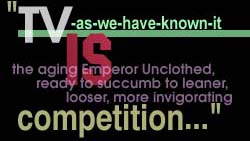
![]()

![]()
The Five Myths of Television Power

Television. Today's drug of choice.
It dominates our minds, controls our thoughts, determines our lifestyle
choices, and manipulates our political behavior.
Or so we are told.
Television is both savior and nemesis. It brings the world to our living rooms. It informs us, educates us, and enlightens us. It desensitizes, brutalizes, and confuses us. It turns our youth into unthinking automatons. It promotes violence, promiscuity, and mindless consumption. It shuts out the real world, trapping us in a mediated reality that is both more beautiful and more dangerous than the workaday reality which most of us actually inhabit.
Television is all-poweful. A single, hard-hitting advertisement can change the shape of an entire political campaign. An on-screen tumble can ruin a candidate's chances of election. Television tells us what to think. What to eat. What to drink.
Television, we are told, is insidious, hooking us when we young, and digging its paralyzing claws deeper and deeper into our souls as we stumble through our lives. Writes Joseph Chilton Pierce in Evolution's End, "television floods the brain with a counterfeit of the response the brain is supposed to learn to make to the stimuli of words or music. As a result, much structural coupling between mind and environment is eliminated; few metaphoric images develop; few higher cortical areas of the brain are called into play; few, if any symbolic structures develop."
Television, according to Pierce, does some very serious neurological damage. And that damage, he argues, has a lot to do with the social ills such as boredom, alienation, materialism, and savagery that plague modern capitalist society. Says Pierce, "Violence on television produces violent behavior in young people. Everyone knows that."
Indeed? And everyone also knows that heavy metal turns normal adolescents into Satan-worshipping mass murderers. Marijuana leads to heroin. Sex education leads to teenage pregnancies. And masturbation...well, god knows how any of us have survived that.
In his book, The Five Myths of Television, media theorist Douglas Davis points out the absurdity of these claims, comparing them to the tendency of some African tribes to blame all reversals and misfortunes on witchcraft. When a young man trips over a stump in a forest path, he claims that evil spirits have "bewitched" his eyes.
Television, the evil spirit of technology, has been similarly bestowed with malevolent powers that defy all argument. Everyone, except, of course, television's critics is "bewitched" by television. The gullible, all-stupid "public" demands trash and gets it (though no one has yet explained why the trash-serving networks are being abandoned in droves by the trash-demanding public). We get, they say, the programs we want. Which begs the question, why is that if you ask a stranger on the street whether he or she is happy with what television offers, the invariable response is "No"? Why is it that everyone thinks television is bad for everyone else, but not for themselves?
Television doesn't affect you, does it? You're not fooled by the ads or deceived by the low-grade propaganda that passes for news. You grew up watching television, but it hasn't turned you into a killer. Has it? Your imagination still works. You still have feelings. You're as shocked as anyone else when you see corpses dragged through the streets in Somalia. Aren't you?
In fact, far from being all-powerful, television is just another appliance. Background noise. Something to do when there's nothing else to do.
Who watches the least television? Why it's those dangerous teenagers, the ones who are driven to kill and rob because they've seen it on television. Teenagers watch very little television. Teenagers are among television's harshest critics. They know it's not real, and more than anything at that critical turning point in their lives, they want to experience the real. Teenagers watch in disgust as their parents vegetate in front of the television, vowing never to do the same.
Teenagers have better things to do.
As for the rest of us, do we really sit passively in front of the TV, absorbing its messages, obeying its commands? Hardly. The remote control, a simple tool that barely qualifies as interactive, gives us enormous power over television, allowing us to reject at will its core commercial function. Industry insiders have admitted that more than 80 percent of American viewers wield their remote controls -- or "zappers" -- with wild abandon, mostly to jump from commercials to another program. Some take this as further evidence of our MTV-shortened attention spans. But the truth is that, hypnotized as we may be by our televisions, we are still awake enough to be irritated by commercials, and physically active enough to push the button that removes them from our screen.
As for politics, far from being the crucial battleground, television may well be the reason why fewer and fewer Americans bother to vote. Bland superficial coverage, a relentless attention to irrelevancies, and a perceived need to package and simplify complex issues have turned television politics into a ratings game and politicians into pollsters. Meanwhile voters turn off and tune out. With television turning politicians into homely media stars with half the charisma and none of the glamor of the real thing, is it any wonder that American political apathy is unmatched anywhere else in the world. Even in Japan, where political corruption is institutionalized and choices are even more limited, a higher percentage of the population participates in the democratic process than in the land of the free.
What television has done is create a society that reviles itself as crass and stupid, that lives in fear of its neighbors, and that is politically paralyzed. Television hasn't done this on its own. It is the myth of television that has brought about this state of affairs. As Douglas Davis writes,
"We told ourselves that TV's magical powers so engulf our neighbors (if not you and me) that all objective matters of right and wrong, not to say the subtle shadings in between, are virtually irrelevant. This dogmatic conviction, repeated every day in one medium of discourse or another, fatally compromises our political rhetoric, our educational policies, our cultural habits, the often inferior products we design (for consumers who presumably can't tell right from wrong, and even our regard for our fellow citizens."
The power of TV is a myth. A myth foisted on us not only by television's proponents, but by its critics as well. TV has made us believe that our society is composed of beer-guzzling cretins with no taste for quality and no interest in anything that passes for art. Network executives believe the myth. Educators believe the myth. Every one of us believes the myth. And in so doing we perpetuate it, allowing the poetential of this marvellous technology to be wasted, all the while shrugging our shoulders and putting the blame on the poor taste and low mental capacity of our fellow citizens.
TV's not bad for you. But wouldn't it be interesting if it were?
Ê
-- Christopher C. Hunt